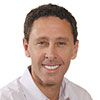Dietary Changes May Help Prevent Cancer

One in two men and one in three women will develop cancer in sometime their lifetime. Although a few patients diagnosed with either chronic myelogenous leukemia or breast cancer can attribute their illness to a hereditary abnormal gene, most people believe their cancer was a result of a mutation to their DNA (where genetic material is stored) possibly caused by a handful of factors like environmental radiation/toxins, poor diet or just bad luck. However, this may not be the case, as some bouts of cancer may be linked to the manner in which cancer cells produce energy.
Cellular respiration is the process in which healthy cells produce energy to function and survive. The thousands of mitochondria (cellular structures responsible for cellular respiration and energy production) rely on oxygen to help break down sugar into energy and store it in molecules of ATP (adenosine triphosphate).
However, there is one defect common to all cancer cells, i.e., the mitochondria do not work properly. This causes cancer cells to find an alternative method of converting the energy in sugar to ATP. This process is fermentation (also commonly referred to as glycolysis) and it is a metabolic activity that converts sugar into a usable form of energy. And while fermentation is inefficient for healthy cells, the mutations in cancer cells dramatically increase the ability of cancer cells to use sugar to make the energy the needed to continue rapidly proliferating. The science behind cancer cells and fermentation is very complex and beyond the scope of this post, but suffice it to say that it stands to reason that if you have cancer, you will fare better if you deprive your tumor cells their primary fuel source – sugar.
With the exception of a few cancers, we really have not made a significant impact on cancer mortality. We continue using treatments that are detrimental to our health; and as a result, we've all lost patients because of treatment complications, rather than from the cancer. While I'm certainly still a mainstream doc and would consent to these barbaric treatments myself if I had cancer, there are two additional steps that I would also take. I’ve discussed my beliefs with many oncologists who were treating patients of mine, I always got the same "in the box" response, which is "we don't have enough data". However, I don't buy it. Based on watching the video I posted at the end of this blog and reading the corresponding book, I would suggest trying:
- Metformin: I've previously posted about how Metformin, one of the most popular, least expensive diabetes drugs on the planet, may help prevent cancer and potentially improve cancer outcomes. We know for a fact that diabetics taking the drug are diagnosed far less often with cancer than those who are not on the drug. One of the mechanisms of action is certainly the fact that metformin lowers blood sugar. This is crucial as blood sugar is the lifeblood of every cancer cell. As previously explained, cancer cannot exist without sugar. Did you ever wonder what a doctor was looking for when a PET scan is ordered? We're looking to see where in the body sugar is being "over utilized", as it is a key feature of EVERY cancer. Metformin also "tricks" the body into believing that it is in a calorically restricted state (also known as calorie restriction mimetic) and we know from many studies that calorie restriction helps prevent cancer, extend life and improve cancer outcomes. If you have cancer, I would ask your doctor to read the book that I mention at the bottom of this blog and consider prescribing Metformin.
- Ketogenic diet: Thomas Seyfried, PhD, an expert on the ketogenic diet, describes the diet as very high in fat, moderate in protein and extremely low in carbohydrates, (i.e., less than 50 grams per day). The human body runs very efficiently on fat and when carbohydrates are restricted, the liver is able to turn fat into a "super fuel" called ketones. Cancer cells can't use ketones (or fat) for fuel, but our cells thrive on them. The ketogenic diet can be a difficult diet to acclimate to for the first two weeks, as your body transitions its fuel source from sugar to fat. For instance, patients often complain about feeling fatigued or as if they were coming down with the flu. However, once that switch flips, they felt energized. Additionally, ketogenic diets are typically one of the better diets for weight loss. There are many online resources and great books further explaining the ketogenic diet in more detail.
I'm not suggesting that everyone should ask their doctor for a prescription for Metformin or simultaneously begin a ketogenic diet, but people who have a higher risk of cancer may want to consider making some dietary changes, at the very least. Although this video is a little scientific, pass it along to friends battling cancer, especially those with brain cancer, as the current standard of care has abysmal outcome. Click here to watch Dr. Seyfried’s video.
